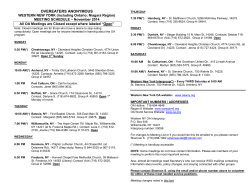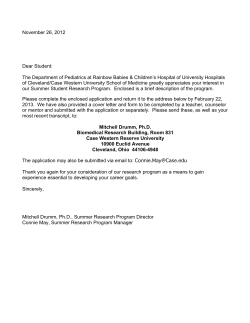
Document 70417
QROVER CLEVELAND C19B5-1O99 C 1fl3-18O7 It is a matter of most historians being in agreement that Grover Cleveland was the strongest President between Abraham Lincoln and Theodore Roosevelt. He was the first Democrat elected after the Civil War, and he remains yet today the only President to ever have served two terms in office without them being consecutive terms. Once in the White House, he quickly earned a reputation for saying “no,” as his political philosophy centered around his belief in allowing the economic forces of a society to work themselves through with as little intervention by the government as possible. Because of this, he angered the farmers who were looking for relief to compensate for their drough t-stricken crops. He also alienated many war veterans by refusing a number of easy-m oney pensions. Cleveland also had a great many problems with labor in his obsession to rid govern ment of the spoils system. Such actions made him unpopular at the end of his first term and he was defeated. The years between 1888 and 1892 saw America return to loyalty and popularity for Grover Cleveland, and he was elected President again in 1892. Cleveland was born in Caidwell, New Jersey, in 1837, one of nine childre n of a Presbyterian minister. His family had very little money, and Grover worked hard at several jobs trying to supplement the family income. His father died when he was only 16, making life even more difficult. He studied law while working as a clerk in a law office in Buffal o, New York, and was admitted to the bar in 1859. He soon developed a reputation of being totally devoted to his clients. His modest entry into politics began in Buffalo, where he was first a ward supervisor, an assistant district attorney and then a sheriff. In 1881 his reputat ion for honesty and reform swept him into office as mayor of Buffalo. His devotion to honest government grew and he was soon after elected Governor of New York. In the presidential electio n of 1884, he won the nomination of the Democratic Party as well as the support of a faction of reform-minded Republicans called “Mugwumps.” His election victory over Republican James G. Blame, however, was very close, winning by less than 30,000 votes. In office, Cleveland faced a Republican Congress that continued to block much of the legisla tion he wanted enacted. He also used his own power of veto to stop their “extravagance in spending,” as he put it. His dealing with the tariff issue and the problems associated with U.S. currency were perhaps the most important issues of his first term. In 1886 he married Frances Folsom, who was only 21 years old and 28 years younge r than Cleveland. She was the daughter of Cleveland’s former law partner. When her father died, Grover became her guardian and raised her to adulthood under the watchful eye of her mother. His affection for her turned to love, and the nation was delighted when the two were the first to marry in the White House. The couple had five children, and her grace and charm made her a popular First Lady. When Cleveland was elected to a second term, the couple was far more popular than Cleveland had been when he entered the White House in 1885. Grover Cleveland died in 1908 at the age of 71. 64 ___________ _______________ ____ ___________ ________ ___ QROVER CLEVELAN Name Presidential Trivia 1. Grover Cleveland, a good-natured large man, had the affectionate nickname of 2. Cleveland won the race for the presidency in 1884, with help from a faction of Republican reformers who called themselves the 3. Grover Cleveland called his young 21-year-old bride, Frances, 4. The man who ousted Grover Cleveland from the White House in 1888 was later defeated by Cleveland in 1892. He was 5. The Democratic political machine that had controlled New York City until Grover Cleveland became Governor of New York and helped destroy the machine was called — 6. The Haymarket Riot in 1886 was the result of a clash between dissatisfied workers and employees at the plant in Chicago. 7. While in the White House, Grover Cleveland and his wife Frances also maintained a house called where they occasionally went to be alone. 8. During Cleveland’s second term of office, what secretly happened to him aboard a friend’s yacht on the East River—a secret that was kept from the public for many years? 9. An intense boundary dispute between Great Britain and Venezuela resulted in Cleveland threatening to use armed force against Great Britain if the matter wasn’t decided by ar bitration. He based his threat on the Doctrine, which warned Euro pean countries against intervention in America. 10. A group of discontented, unemployed workers, sought financial aid by marching unsuccessfully on Washington under their leader, Jacob Coxey, who was arrested by Cleveland for walking on the grass. 11. In 1886, President Grover Cleveland dedicated a famous gift from France on Bedloe’s Island called the 12. One of Grover Cleveland’s chief concerns during his second term of office was in main taining as the standard of U.S. currency. 65 OVER CLEVELAND Name For ThinkIng and Discussing 1. What was the general overall political philosophy of Grover Cleveland that made him un popular during his first term of office even though people respected him for his honesty? 2. How would you describe life in the White House during the Grover Cleveland years? 3. When Cleveland took office for the second time, the nation, as whole, a was overjoyed to see him. When he left the White House four years later, his popula rity had worn thin. What caused his popularity to decline to “a battered old name” as he referred to it? 4. What steps did Cleveland take to ensure that gold remained the standard of U.S. curren cy? 44444*44•44444444 66
© Copyright 2025





















